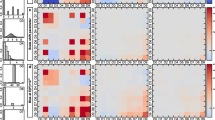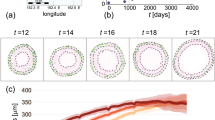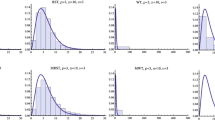Abstract
In this paper, we improve ratio- and product-based estimators for population mean using known coefficient of variation of the auxiliary variable through modified maximum likelihood. The expressions for biases and mean square errors of the proposed estimators have been obtained theoretically. We obtain some conditions under which the proposed estimators have minimum mean square errors than other existing estimators. For the support of the theoretical outcomes, simulations studies have been made under several super-population models. One real life application for the support of the properties of the proposed estimator has also been given. We also study the robustness properties of the proposed estimators. We show that the use of modified maximum likelihood estimates in estimating finite population mean results to robust estimates under non-normality and outliers. Confidence intervals show that the proposed estimator has shorter confidence intervals and more coverage of estimates than those of the existing estimators.









Similar content being viewed by others
References
Bouza CN (2008) Ranked set sampling for the product estimator. Rev Investig Oper 29(3):201–206
Bouza CN (2015) A family of ratio estimators of the mean containing primals and duals for simple random sampling with replacement and ranked set sampling designs. J Basic Appl Res Int 8(4):245–253
Chanu WW, Singh BK (2014) Improved class of ratio-cum-product estimators of finite population mean in two phase sampling. Glob J Sci Front Res 14(2–1):69–81
Chanu WW, Singh BK, Tato YA (2016) Generalized class of double sampling ratio cum dual to ratio estimator in presence of non-response. GU J Sci 29(2):335–341
Choudhury S, Singh BK (2012) A class of chain ratio-cum-dual to ratio type estimator with two auxiliary characters under double sampling in sample surveys. Stat Trans New Ser 13(3):519–536
Cochran WG (1977) Sampling techniques. Wiley, New York
Diana G, Giordan M, Perri PF (2011) An improved class of estimators for the population mean. Stat Methods Appl 20:123–140
Gupta S, Shabbir J (2008) On the improvement in estimating the population mean in simple random sampling. J App Stat 35(5):559–566
Gupta S, Shabbir J (2011) On estimating finite population mean in simple and stratified sampling. Commun Stat Theory Method 40:199–212
Kumar S (2015) A robust regression type estimator for estimating population mean under non normality in the presence of non-response. Glob J Sci Front Res F 15(7–1):43–55
Kumar S, Chhaparwal P (2016) A robust unbiased dual to product estimator for population mean through modified maximum likelihood in simple random sampling. Cogent Math 3:1168070
Kumar S, Chhaparwal P (2017) Robust exponential ratio and product type estimators for population mean using order statistics in simple random sampling. Int J Ecol Econ Stat 38(3):51–70
Murthy MN (1967) Sampling theory and methods. Statistical Publishing Society, Calcutta
Oral E (2006) Binary regression with stochastic covariates. Commun Stat Theory Method 35:1429–1447
Oral E (2010) Improving efficiency of ratio-type estimators through order statistics. JSM Proceedings, section on survey research methods. American Statistical Association, Alexandria, pp 4231–4239
Oral E, Kadilar C (2011) Robust ratio-type estimators in simple random sampling. J Korean Stat Soc 40:457–467
Oral E, Oral E (2011) A robust alternative to the ratio estimator under non-normality. Stat Probab Lett 81:930–936
Pandey BN, Dubey V (1988) Modified product estimator using coefficient of variation of auxiliary variate. Assam Stat Rev 2:64–66
Penrose K, Nelson A, Fisher AG (1985) A generalized body composition prediction equation for men using simple measurement techniques. Med Sci Sports Exerc 17(2):189
Puthenpura S, Sinha NK (1986) Modified maximum likelihood method for the robust estimation of system parameters from very noisy data. Automatica 22:231–235
Rao JNK, Beegle LD (1967) A Monte Carlo study of some ratio estimators. Sankhya Ser B 29:47–56
Singh HP, Solanki RS (2012) An alternative procedure for estimating the population mean in simple random sampling. Pak J Stat Oper Res VIII 2:213–232
Sisodia BVS, Dwivedi VK (1981) A modified ratio estimator using coefficient of variation of auxiliary variable. J Indian Soc Agric Stat New Delhi 33:13–18
Sukhatme PV, Sukhatme BV, Asok C (1984) Sampling theory of surveys with applications. Indian Society of Agricultural Statistics, New Delhi
Tiku ML, Akkaya AD (2004) Robust estimation and hypothesis testing. New Age International (P) Limited, New Delhi
Tiku ML, Bhasln P (1982) Usefulness of robust estimators in sample survey. Commun Stat Theory Method 11:2597–2610. https://doi.org/10.1080/03610918208828409
Tiku ML, Kumra S (1981) Expected values and variances and covariances of order statistics for a family of symmetric distributions (student’s t). In: Selected tables in mathematical statistics. Am Math Soc 8:141–270
Tiku ML, Suresh RP (1992) A new method of estimation for location and scale parameters. J Stat Plann Inference 30:281–292
Tiku ML, Vellaisamy P (1996) Improving efficiency of survey sample procedures through order statistics. J Indian Soc Agric Stat 49:363–385
Vaughan DC (1992a) On the Tiku-Suresh method of estimation. Commun Stat Theory Method 21:451–469
Vaughan DC (1992b) Expected values, variances and covariances of order statistics for student’s t-distribution with two degrees of freedom. Commun Stat Simul Comput 21:391–404
Vaughan DC, Tiku ML (2000) Estimation and hypothesis testing for non-normal bivariate distribution with applications. Math Comput Model 32:53–67
Yadav SK, Kadilar C (2013) Efficient family of exponential estimators for the population mean. Hacet J Math Stat 42(6):671–677
Yates F (1960) Sampling methods in censuses and surveys. Charles Griffin and Co., London
Acknowledgements
The authors are thankful to the Editors and referees for their valuable suggestions which led to improvements in the work.
Author information
Authors and Affiliations
Corresponding author
Additional information
Publisher's Note
Springer Nature remains neutral with regard to jurisdictional claims in published maps and institutional affiliations.
Rights and permissions
About this article
Cite this article
Kumar, S., Chhaparwal, P. Ratio- and product-based estimators using known coefficient of variation of the auxiliary variable via modified maximum likelihood. Life Cycle Reliab Saf Eng 8, 99–116 (2019). https://doi.org/10.1007/s41872-019-00077-0
Received:
Accepted:
Published:
Issue Date:
DOI: https://doi.org/10.1007/s41872-019-00077-0
Keywords
- Ratio estimator
- Product estimator
- Simulation study
- Modified maximum likelihood
- Population coefficient of variation
- Confidence interval




